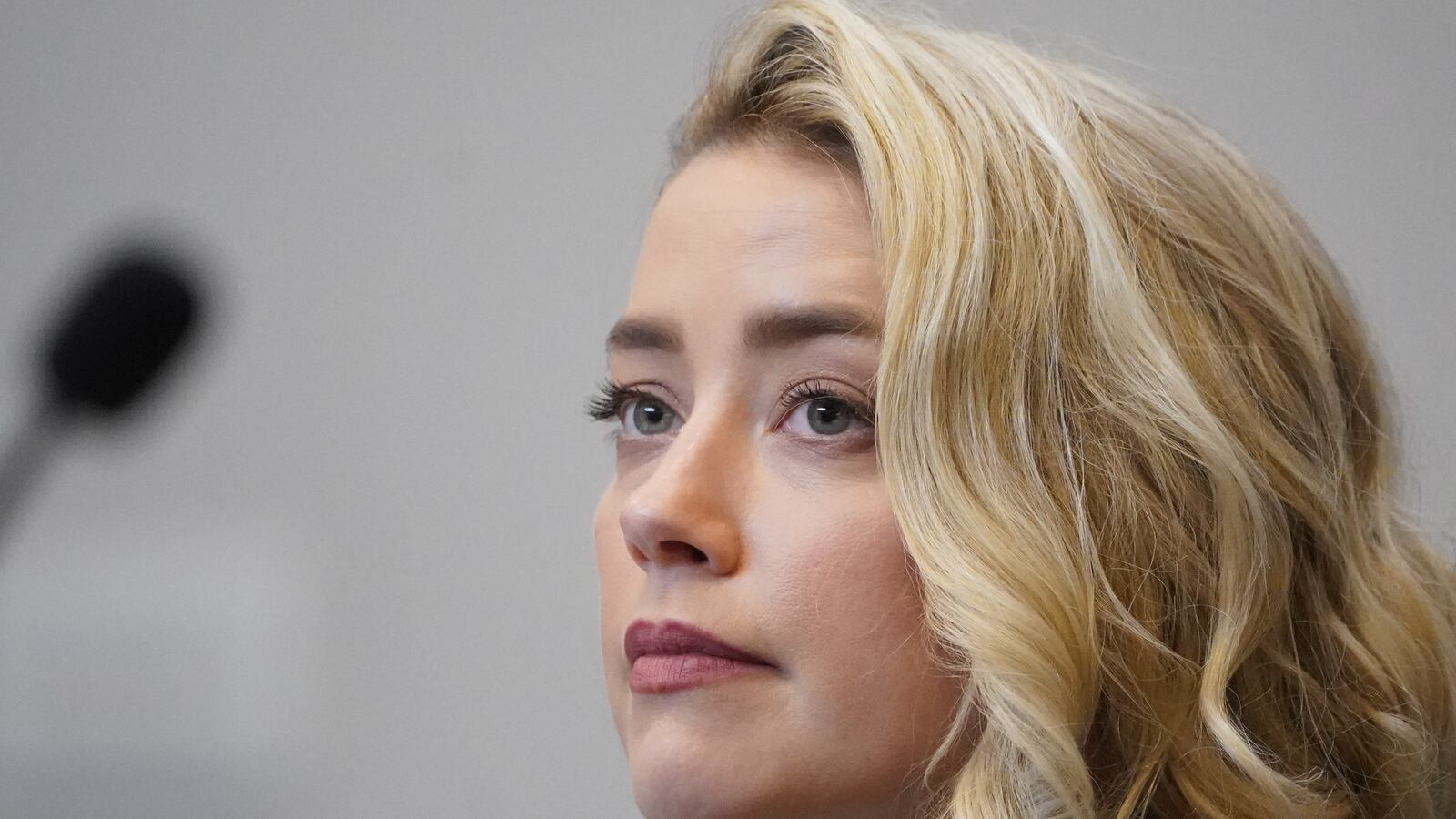A movie-industry consultant hired by Amber Heard’s lawyers said on Monday that the actress has lost $45 to $50 million of income she could have expected to earn from screen roles and product endorsements because of the fallout from her failed relationship and breakup with actor Johnny Depp.
Kathryn Arnold, an industry consultant asked to tally Heard’s estimated losses, said the Aquaman co-star was poised for a major breakout into multi-million dollar roles. That is, before Depp and his lawyer at the time, Adam Waldman, defamed her by branding her a liar when she claimed in a 2018 op-ed to be a victim of domestic violence, Arnold testified.
Between statements made by Waldman in 2020 and 2021—which Arnold said “instigated” widespread haranguing of Heard by Depp fans on social media using hashtags such as #AmberHeardIsAnAbuser—her career ground to a halt, Arnold suggested. She spoke to a jury doing its work amid an ongoing phenomenon of pro-Depp, anti-Heard bile on social media, where legions of Depp fans attack her claims to being a survivor and suggest Depp is on his way to a victory in court.
“When there's negative social media it can be very bad, because not only can social media be directed at the actor or the actors themselves, but it can also be directed towards the movie, towards the movie company, towards the product that the actor or actors are working with,” she said. “So it becomes very complicated and it can get very messy to continue working with an actor or an actress if there’s a lot of negative social media around.”
Depp has sued Heard, alleging that she “devastated” his career with the 2018 Washington Post op-ed that did not name him but in which she described herself as a domestic violence survivor—two years after she filed a temporary restraining order against the actor.
Heard has counter-sued Depp, claiming that he and his legal team launched a “smear campaign” against her after her op-ed—including claims from Waldman that called her domestic violence allegations “a hoax.”
Waldman was Depp’s libel lawyer in his failed defamation case against a British tabloid that called Depp a “wife beater.” He was representing Depp in the ongoing Virginia case until a judge barred him, citing press leaks of case evidence—namely, tapes of private conversations between Depp and Heard.
Waldman testified last week in a videotaped deposition but often cited attorney-client privilege in declining to answer questions. He did acknowledge having had contact with pro-Depp, anti-Heard voices on social media.
Both actors say the other sabotaged their earnings. But while the jury has long heard evidence supporting and refuting the notion that Depp’s perch as the Pirates of the Caribbean icon was wrongly undermined by Heard, the testimony Monday offered new insight into how Heard’s career was impacted.
With her co-starring role in Aquaman, the first DC Comics superhero movie to gross more than $1 billion, “She was on the precipice of a meteoric rise” around 2018-19, Arnold testified.
Heard instead found herself written down to a minimal role in Aquaman 2, due in March 2023, and barred from participating in promotional events such as fan convention appearances, Arnold testified. She was paid $2 million for the sequel and has a contract to earn $4 million if a third installment is made.
The actress also had a $1.5 million, two-year endorsement contract with L’Oreal makeup, but they stopped inviting her to promotions and later “extended” the contract on an open-ended basis after the initial two years, but with no additional pay and no immediate prospect of activity, Arnold said.
Using the roles, paydays, endorsements, and career trajectories of actors including Jason Momoa, Ana de Armas, Gal Gadot, Chris Pine, and Zendaya, Arnold argued, “It’s very likely that Ms. Heard should have earned between $45 and $50 million over that time period”—meaning a period of about five years.
Under cross-examination by a Depp lawyer, Wayne Dennison, Arnold recanted her description of Heard’s prospects as “meteoric,” saying the term would apply more to Momoa, whose movie fees have multiplied tenfold. She acknowledged that Heard was not in the same league as Momoa or even Zendaya, a star of 2019’s Spider-man: Far From Home and 2021’s Dune. “They’re not identical,” she said.
“But you can just look at what their career has done either before that superhero movie and others, or the one they were in, and then you look at where their career should have gone,” she said. “Even though she may not have been at the stature of a Zendaya at that time, you can still look at it as a comparable trajectory of what happens when you’re in a blockbuster movie.”
Asked if there's any coming back from this kind of the social-media attacks Heard endured, Arnold said yes, eventually, but added, “First of all, it has to stop.”
Arnold referred to earlier testimony by Ron Schnell, a computer scientist and data researcher, about damage to the actress’ reputation. Schnell said that between 2020 and 2021, more than a million hashtags appeared on social media expressing negative sentiments about Heard, including #AmberHeardIsAnAbuser, and #AmberTurd, some containing Waldman’s name and his “hoax” language.
Asked by Dennison, Arnold said she had been paid about $60,000 total over three years of working for Heard on the defamation case.
After Heard’s lawyers announced on Tuesday morning they were done presenting their case, Depp’s attorneys brought on the first of a number of rebuttal witnesses in Walter Hamada, president of DC Films. Testifying in a pre-recorded video, Hamada reiterated the Depp team’s argument that screen chemistry with Momoa, not negative publicity surrounding her breakup with Depp, was responsible for Heard’s reduced presence in Aquaman 2.
“The reality is, it’s not uncommon on movies for two leads to not have chemistry,” Hamada said under questioning. He added that chemistry could be “fabricated” in post-production through editing and on-screen music. “If you watch the movie, they look like they had great chemistry. But I just know through the course of the post-production that it took a lot of effort to get there.”
Hamada said the issue of chemistry—which he summarized as, “What makes a movie star a movie star? You know it when you see it.”—was discussed between himself and others, including Momoa and Aquaman producer Peter Safran, but not in written correspondence.
“Documents? No,” he said. “These were all conversations.”







